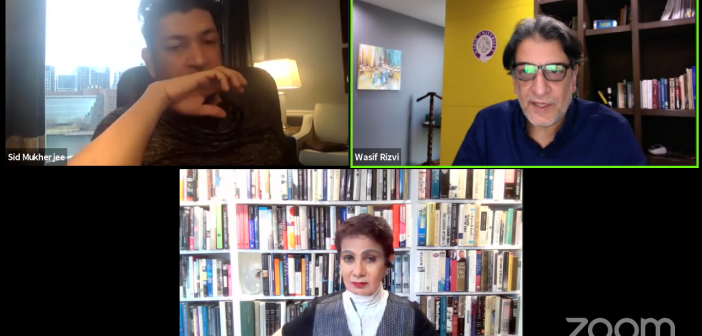Cancer is one of the biggest killers in the world. But one woman has taken it upon herself to fight it at inception, its first cell before it can metastasize and cause irreparable harm.
The Chairperson, Habib University Foundation (USA) and award-winning Oncologist, Dr. Azra Raza, is currently practising at the Columbia Presbyterian Hospital where she is conducting her cutting-edge research on leukaemia. Dr. Raza also embodies a rich cultural heritage and has a great passion for Urdu Literature. With over 300 peer-reviewed manuscripts in high-profile journals, she is a leading international authority on pre-leukaemia and acute leukaemia.
Recently in a virtual session organized by Habib University, she discussed her book, “The First Cell: And the human costs of pursuing cancer to the last”, which is an account of how medicine and society mistreat cancer.
The esteemed President of Habib University, Mr. Wasif Rizvi inaugurated the session with an introduction of the moderator, Dr. Siddhartha Mukherjee. Dr. Mukharjee is a renowned Indian-American physician, oncologist and author. His book ‘The Emperor of All Maladies’, a biography on cancer won many literary accolades across the globe.
While highlighting the remarkable breakthroughs of Dr. Raza and Dr. Mukherjee in the field of oncology, President Wasif expressed,
“Sid, along with Dr. Azra Raza, are our fearless and noble warriors.”
Dr. Azra’s book explores cancer from all the angles of medical, scientific, cultural, and personal areas. The book also presents Dr. Raza’s story of how her husband, succumbed to leukaemia, and what turmoil she went through regularly; being her own husband’s oncologist.
Dr. Mukherjee while describing the ascension of Dr. Azra Raza throughout her career journey said, “Azra is the combination of three scopes in one; a kaleidoscope, a microscope and a telescope.”
During the talk, Dr. Azra shared her motivation to write this book. She explained that even though she has been working as an oncologist for years, what propelled her to write this book was the death of her daughter’s best friend. He was a 22-year-old boy who died due to a late diagnosis of an aggressive tumour in his brain. This unfortunate incident filled her with an urge to take action against such negligence. She was compelled to create awareness and ignite the sense of urgency in the field of medicine; for the development of relatively less painful and accurate ways to detect the first cancer cell in the human body.
‘The First Cell’ is another step in her battle against cancer, to shift the paradigm of cancer treatment and the research strategies of this deadly disease.
In her book, Dr. Raza has advocated for the earliest possible detection of the first cancer cell in the human body, through a blood test, for its easier elimination. She has further discussed the two well-known facts about cancer that are beyond any dispute: the first being that 90% of cancer found at stage 1 is curable, whereas 90% found on stage 4, becomes corrosive and incurable.
Her argument in the book is centred on the idea that the current practices of imaging through mammograms, X-rays and ultrasounds to detect cancer only cater to the later stages of cancer. At that point, especially at stage 4, it is already too late to get rid of it.
As someone who has already treated many cancer patients and faced her husband’s unfortunate death from leukaemia, Dr. Raza’s book is the amalgamation of science and stories of hope from her patients, interwoven with storytelling. The book features testimonials from her patients, who have shared their experiences of treatment journeys. She has included the stories of patients who are alive and fought through cancer like true warriors and also with the families of those who have lost their loved ones, against this disheartening scourge.
As a literature and poetry aficionado, Dr. Raza further accentuated the conversation by quoting verses from Mirza Ghalib, to explain how she uses prose and music to calm her patients and helps them deal with their pain and loss.
The most unique aspect of this book is the way she has framed this issue as a collective problem, in which one’s individual pain affects the entire society. Her ability to ignite the sense of urgency for treatment at the earliest stages has transformed this health issue into a problem that can be resolved.
The talk was concluded with Dr. Raza emphasizing the immediate need for advanced technology to expedite the process of early detection of cancerous cells of the human body. She also briefly mentioned her initiative of founding a think tank, during the pandemic that involves the world’s leading academics, doctors and scientists; all gathered to serve the purpose of creating new cancer testing opportunities and advanced technology for the masses – that are relatively more regular and accessible.
The book is the fusion of her favourite poetry, personal anecdotes, and excerpts that articulate the relationship between the patient and the doctor, during this dark time.




